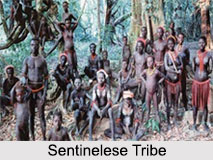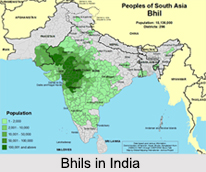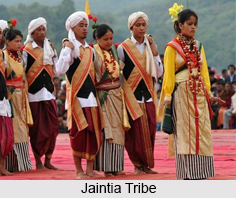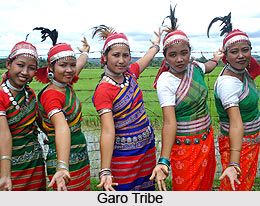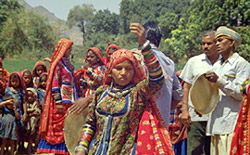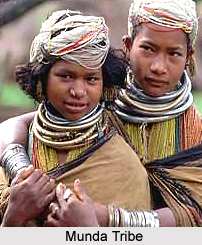 Munda Clans consists of almost 106 clans of the tribal group. Some of them have clear meanings, while others carry doubtful meanings. The names of these Munda clans have been mostly defined with objects associated with the tribal group.
Munda Clans consists of almost 106 clans of the tribal group. Some of them have clear meanings, while others carry doubtful meanings. The names of these Munda clans have been mostly defined with objects associated with the tribal group.
The Munda Tribe, residing in the Chota Nagpur Plateau in Jharkhand, adjacent parts of Madhya Pradesh and West Bengal and the hill districts of Odisha, is thought to have evolved from the South East Asia. Munda tribes are one of the largest tribes of India, but have been divided into several sub groups such as Patar, Mahali, Kampat Munda, etc.
Some of the clear meanings of the Munda clans are mentioned below:
•Baba - Paddy
•Bage - Probably a corrupt form of Bagh
•Bale - A variety of fish
•Balemucu - A fish net
•Barjo - Barujo, a fruit
•Barla - A tree, a recent innovation
•Baru - A tree
•Bengra - Bhengra, an old word meaning horse, the clan is so named because the members ate the flesh of a horse
•Bhus - The Bandi root
•Bhut - Either lentil or Hindi bhut (spirit)
•Bodra - Connected with a story with Soderbodor, refraining the hands and mouth from ablution after meal
•Bulung - Salt
•Canlikutungorea - A bundle of rice suspended by a stick resting on the shoulder and carried by an Orea
•Cauria - Indian rat
•Cutu Purti - Mice
•Dang - A pole
•Danguar - Young and unmarried
•Dorrae - A hole in a tree
•Dungdung - A long and slender fish
•Edelsanga - The tap-root of the sapling of the cotton
•Gari - A monkey
•Guria - A tree
•Hapadgara - Hole containing leeches
•Hasa - A wild potherb
•Hasapurti - A kind of wild potherb
•Hau - The red ant
•Hemrom - A tree
•Here - A bird
•Holongpurti - Flour or cake
•Horo - A land tortoise
•Hunipurti - Rat
•Jojo - A tamarind tree
•Jojoar - Probably from Jojo
•Jomtuti - Jom means to eat; the name means that the mother clan should not eat the grain
•Jorabarjo - Descendents of Barjo family, who once cooked their meal on the fireplace of Jora (a caste of boatman)
•Kalipurti - Kali means deaf
•Kandir - People doing something with half a maund
•Kandulna - Believed to be gold
•Kaua - A crow
•Korketa - A bird
•Kongadi - Believed to mean an alfino crow
•Kuda - A tree
•Kujuri - A climbing shrub
•Kula - Tiger or leopard
•Kungkal - A kind of patter wasp
•Lang - A bird
•Langbodra - A Bodra related to Land clan
•Maukal - A bird
•Mundu - To introduce something in its fullest length into a hole or pit
•Murum - The buck of the Nilghan
•Nisha - Intoxication (derived from Hindi)
•Orea - Believed to be a black jungle bird, a caste of bamboo workers
•Pandomundu - Pande means the clerk of the landlord does not seem to fit in with the meaning intended
•Pandu - Nag, a snake
•Putam - A dove
•Ramra - A pulse
•Ramrabodra - A Bodra related to the Ramra clan
•Runda - A wild cat
•Sakiribodra - A Bodra untidy in eating
•Salumaena - A bird
•Sandiguria - A Guria connected with a Sandi clan existing formerly
•Sandimurum - A Murum connected with a Sandi clan
•Sandipurti - A person of Purti clan connected with a Sandi clan
•Sandil - Believed to be a bird
•Sanga -The sweet potato
•Sarukadpurti - Something to do with taro plant
•Singha - A Hindi word meaning horn
•Sirka - A tree
•Soe - Rotting or sometimes a fish, subdivisions of this clan are Tuing Soe, Jang Soe, Til
•Soemurum - A rotting nilighan buck
•Solesoe - A rotting fish of the sole kind
•Sukuriputur Orea - Scrapping off the pig`s heir by an Orea
•Surin - Believed to mean a red paradise fly-catcher
•Teni - A wild dog
•Tao - A wild dog
•Tara e ba - The flower of a jungle shrub
•Tebobodra - Bodras living in the Tefo village (Singhbhum district)
•Tero - Lakra, a wolf
•Tilming - The plant of an oilseed
•Tirki - Little brown dove
•Tiru - A small, strong, young buffalo
•Tirung - A bird
•Tuti - A food grain
Some of the Munda clans carry doubtful meanings which are mentioned below:
•Bading
•Bur
•Campia
•Digicampia
•Duduria
•Dunduar
•Engapurti
•Ergat
•Hamsai
•Has
•Hobo
•Mundri
•Lughun
•Kauriar
•Nagruar
•Purti
•Samad
•Sandigarai
•Sangkura
•Sanguar
•Tiro
•Tirusanga

















